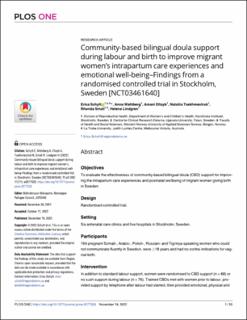| dc.contributor.author | Schytt, Erica | |
| dc.contributor.author | Wahlberg, Anna | |
| dc.contributor.author | Eltayb, Amani | |
| dc.contributor.author | Tsekhmestruk, Nataliia | |
| dc.contributor.author | Small, Rhonda | |
| dc.contributor.author | Lindgren, Helena | |
| dc.date.accessioned | 2023-03-21T11:45:45Z | |
| dc.date.available | 2023-03-21T11:45:45Z | |
| dc.date.created | 2022-12-06T09:31:20Z | |
| dc.date.issued | 2022 | |
| dc.identifier.citation | PLOS ONE. 2022, 17 (11), . | en_US |
| dc.identifier.issn | 1932-6203 | |
| dc.identifier.uri | https://hdl.handle.net/11250/3059511 | |
| dc.description.abstract | Objectives To evaluate the effectiveness of community-based bilingual doula (CBD) support for improving the intrapartum care experiences and postnatal wellbeing of migrant women giving birth in Sweden. Design Randomised controlled trial. Setting Six antenatal care clinics and five hospitals in Stockholm, Sweden. Participants 164 pregnant Somali-, Arabic-, Polish-, Russian- and Tigrinya-speaking women who could not communicate fluently in Swedish, were ≥18 years and had no contra-indications for vaginal birth. Intervention In addition to standard labour support, women were randomised to CBD support (n = 88) or no such support during labour (n = 76). Trained CBDs met with women prior to labour, provided support by telephone after labour had started, then provided emotional, physical and communication support to women throughout labour and birth in hospital, and then met again with women after the birth. Primary outcomes Women’s overall ratings of the intrapartum care experiences (key question from the Migrant Friendly Maternity Care Questionnaire) and postnatal wellbeing (mean value of Edinburgh Postnatal Depression Scale) at 6–8 weeks after birth. Results In total, 150 women remained to follow-up; 82 women (93.2%) randomised to receive CBD support and 68 women (89.5%) randomised to standard care (SC). Of women allocated CBD support, 60 (73.2%) received support during labour. There were no differences between the groups regarding women’s intrapartum care experiences (very happy with care: CBD 80.2% (n = 65) vs SC 79.1% (n = 53); OR 1.07 CI 95% 0.48–2.40) or emotional wellbeing (EPDS mean value: CBD 4.71 (SD 4.96) vs SC 3.38 (SD 3.58); mean difference 1.33; CI 95% - 0.10–2.75). Conclusions Community-based doula support during labour and birth for migrant women neither increased women’s ratings of their care for labour and birth nor their emotional well-being 2 months postpartum compared with receiving standard care only. Further studies on the effectiveness of CBD powered to evaluate obstetric outcomes are needed. | en_US |
| dc.language.iso | eng | en_US |
| dc.publisher | Public Library of Science | en_US |
| dc.rights | Navngivelse 4.0 Internasjonal | * |
| dc.rights.uri | http://creativecommons.org/licenses/by/4.0/deed.no | * |
| dc.title | Community-based bilingual doula support during labour and birth to improve migrant women’s intrapartum care experiences and emotional well-being–Findings from a randomised controlled trial in Stockholm, Sweden [NCT03461640] | en_US |
| dc.type | Peer reviewed | en_US |
| dc.type | Journal article | en_US |
| dc.description.version | publishedVersion | en_US |
| dc.rights.holder | © 2022 Schytt et al. | en_US |
| dc.source.pagenumber | 20 | en_US |
| dc.source.volume | 17 | en_US |
| dc.source.journal | PLOS ONE | en_US |
| dc.source.issue | 11 | en_US |
| dc.identifier.doi | 10.1371/journal.pone.0277533 | |
| dc.identifier.cristin | 2089224 | |
| cristin.ispublished | true | |
| cristin.fulltext | original | |
| cristin.qualitycode | 1 | |

